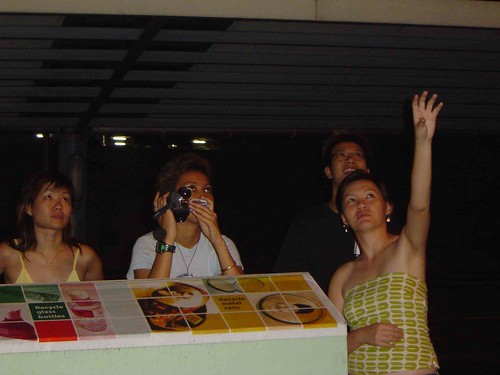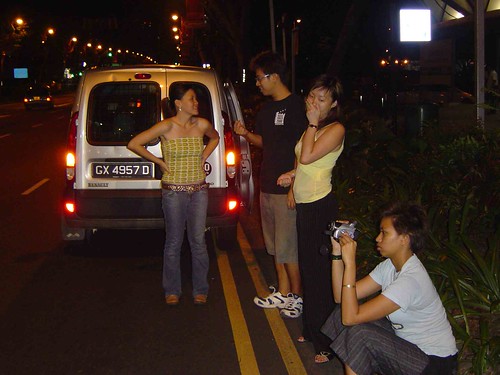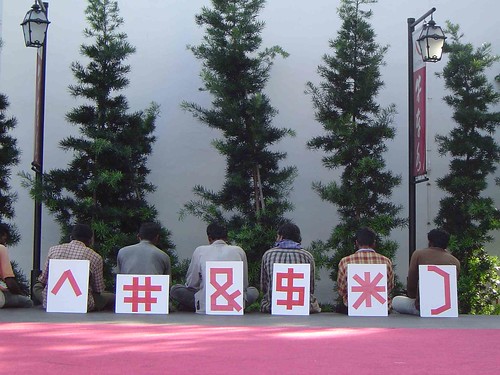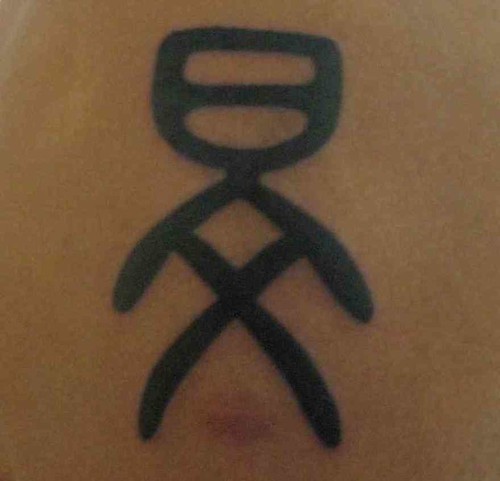Flying By Night
Last weekend was a crazy marathon of video-making.
I joined Fly By Night with some friends, and the gist of it was that you had 40 hours in which to write, shoot and edit your short film after getting the theme on Friday evening. Past themes included "5 Minutes" and "Speed".
This year the theme was: ^#&$*)
Yep, you read it right. The six symbols above made up the theme.
One of the random thoughts Mel put out was about how these keys are rarely used on the keyboard, and how they'd feel left out. Everyone got a mental picture of people walking around dressed as keys from a keyboard and bitching to each other about their miserable lives. The Woes of the Forgotten Keys, so to speak.
And somehow during those four hours we spent coming up with the idea (we probably took longer than everyone else), it evolved into a documentary about the "Forgotten People" of Singapore. People who you may pass everyday on the streets yet hardly pay any attention to. People who may play an important role in our lives, but who we ignore all the time.
We had a whole list of these people to shoot, ranging from AIDS patients to foreign workers to mentally-challenged children. But in the end, due to constraints (40 hours being one of the largest) we had to be more realistic.
We headed out to get some night shots, which we didn't end up using at all, and had about four hours of sleep before we started the project proper.


The van I borrowed turned out to be extremely useful, especially in a shoot like ours, where we had to go all around town and basically try to find good footage. Luckily for us (but sadly a poor reflection on society), we seemed to be able to find interesting (read: generally sad-looking) subjects just about everywhere we turned. We'd literally stop for lunch and find a beautiful shot right outside the carpark.


We ended up with about 90 minutes of footage that day, which we had to cut into a five-minute short. That's probably one of the highest shooting ratios I've ever had to deal with.
The fascinating thing about making a documentary is how unpredictable it is. Most of your shots are obtained purely by chance. You observe and decide what to shoot. But if you were someplace else at the time, you'd get completely different footage. Then in the edit, the footage you can somehow speaks to you and certain themes and decisions emerge as a result of that. We ended up focusing on three main groups of people: The aged derelict, unskilled foreign workers, and the handicapped. That wasn't planned, it just happened. And similarly, other theories and concepts just came to the forefront in the edit spontaneously. What a rush!
I think the best part about working on something like this is the complete lack of any boundaries. Working in the broadcast media, as most of us did, can be a real bitch. There are so many guidelines and rules on what you can and cannot do. Suddenly we were in a situation where we could do anything, whatever the fuck we wanted, and it was like tons of doors just opened up in front of us. It's something that can never be properly understood until you actually work in the industry for a while. Such opportunities are so rare that when you actually get to do it it's really exhilarating. I know I'd never get a chance to do a documentary with harsh social criticism in my ordinary line of work. Actually, I'd never made a real documentary before (video docs of student film shoots don't really count), so this was doubly exciting for me.
I also loved the free-flowing collaboration process. There was no director, no assigned writer or editor. In fact I probably got the only assigned task - designated driver, and I was the team leader only by virtue of the fact that I'd handed in the entry form.
It's integral to my enjoyment of a project that there's interaction and exchange of ideas at every level. That's why I'm also enjoying my current show at work, because people are willing to listen. I don't see why that's so hard to understand for most bosses. When your opinion can be heard, you automatically feel more connected to the project. You feel like part of the team, you feel like you're contributing, like you're valued, you put in more effort, you work harder and better. It's not that complicated, it's just that so few people in power really understand that.
Anyone knows why something edited in Final Cut Pro 4 wouldn't put to tape (mini DV) using a firewire cable? We tried for over two hours, to no avail. Lots of troubleshooting tips from people, but none of them worked. It could've been an unblacked tape, but then I couldn't input my own timecode or change that in the timeline and... ugh. Whatever. I'm just glad that little episode is over. Even though we did just give up and export to DVD.
The screening was in Sunday afternoon, two hours after the deadline. Of course I was late, I was bloody tired. It ended up being rather fun, as many of the entries were rather clever and entertaining. Of course, with any short film program, there's bound to be a whole bunch of crap mixed in, but that's only to be expected.
The ten winners were announced at the end of it all, and it became clear that they were the ones whose films had made a positive impression and stuck in your head. Like the Kungfu Hustle spoof, the Low-budget Karaoke Music Video, the Cute Kitty Animation, the Big Loser, etc.
What was especially striking was that one of the winning teams was made up of 14 and 15 year-olds. Their idea was a world in which obscenities were considered polite and politeness considered obscene. So you have a classroom setting, and the teacher enters and says, "Good morning, motherfuckers." Very smart, clever twist on the theme. And of course it gave the kids a chance to swear like there was no tomorrow onscreen, which I'm sure they relished.
When I was watching it, I thought it'd been done by adults, who'd gotten their little siblings and cousins to act in it. Then when I found out it'd been kids who'd gotten their teacher to play along, I'd have to say, I was pretty impressed. Kids nowadays. Cool teacher though, to take part in something like this. And I'm sure the kids will never forget this experience. This is what education should be all about, not stupid dates and numbers and facts.
Anyway, yeah, we were one of the ten. Got a little bit of money, which is hardly enough to cover a ticket to one of the many concerts I'm attending in the coming months. But it's better than nothing, and it did feel good.
Now all I have to do is go back and tweak the sound so it doesn't peak so much. But I feel lazy and probably won't do it till next week. Besides, I'm on shoot all weekend.
I joined Fly By Night with some friends, and the gist of it was that you had 40 hours in which to write, shoot and edit your short film after getting the theme on Friday evening. Past themes included "5 Minutes" and "Speed".
This year the theme was: ^#&$*)
Yep, you read it right. The six symbols above made up the theme.
One of the random thoughts Mel put out was about how these keys are rarely used on the keyboard, and how they'd feel left out. Everyone got a mental picture of people walking around dressed as keys from a keyboard and bitching to each other about their miserable lives. The Woes of the Forgotten Keys, so to speak.
And somehow during those four hours we spent coming up with the idea (we probably took longer than everyone else), it evolved into a documentary about the "Forgotten People" of Singapore. People who you may pass everyday on the streets yet hardly pay any attention to. People who may play an important role in our lives, but who we ignore all the time.
We had a whole list of these people to shoot, ranging from AIDS patients to foreign workers to mentally-challenged children. But in the end, due to constraints (40 hours being one of the largest) we had to be more realistic.
We headed out to get some night shots, which we didn't end up using at all, and had about four hours of sleep before we started the project proper.


The van I borrowed turned out to be extremely useful, especially in a shoot like ours, where we had to go all around town and basically try to find good footage. Luckily for us (but sadly a poor reflection on society), we seemed to be able to find interesting (read: generally sad-looking) subjects just about everywhere we turned. We'd literally stop for lunch and find a beautiful shot right outside the carpark.


We ended up with about 90 minutes of footage that day, which we had to cut into a five-minute short. That's probably one of the highest shooting ratios I've ever had to deal with.
The fascinating thing about making a documentary is how unpredictable it is. Most of your shots are obtained purely by chance. You observe and decide what to shoot. But if you were someplace else at the time, you'd get completely different footage. Then in the edit, the footage you can somehow speaks to you and certain themes and decisions emerge as a result of that. We ended up focusing on three main groups of people: The aged derelict, unskilled foreign workers, and the handicapped. That wasn't planned, it just happened. And similarly, other theories and concepts just came to the forefront in the edit spontaneously. What a rush!
I think the best part about working on something like this is the complete lack of any boundaries. Working in the broadcast media, as most of us did, can be a real bitch. There are so many guidelines and rules on what you can and cannot do. Suddenly we were in a situation where we could do anything, whatever the fuck we wanted, and it was like tons of doors just opened up in front of us. It's something that can never be properly understood until you actually work in the industry for a while. Such opportunities are so rare that when you actually get to do it it's really exhilarating. I know I'd never get a chance to do a documentary with harsh social criticism in my ordinary line of work. Actually, I'd never made a real documentary before (video docs of student film shoots don't really count), so this was doubly exciting for me.
I also loved the free-flowing collaboration process. There was no director, no assigned writer or editor. In fact I probably got the only assigned task - designated driver, and I was the team leader only by virtue of the fact that I'd handed in the entry form.
It's integral to my enjoyment of a project that there's interaction and exchange of ideas at every level. That's why I'm also enjoying my current show at work, because people are willing to listen. I don't see why that's so hard to understand for most bosses. When your opinion can be heard, you automatically feel more connected to the project. You feel like part of the team, you feel like you're contributing, like you're valued, you put in more effort, you work harder and better. It's not that complicated, it's just that so few people in power really understand that.
Anyone knows why something edited in Final Cut Pro 4 wouldn't put to tape (mini DV) using a firewire cable? We tried for over two hours, to no avail. Lots of troubleshooting tips from people, but none of them worked. It could've been an unblacked tape, but then I couldn't input my own timecode or change that in the timeline and... ugh. Whatever. I'm just glad that little episode is over. Even though we did just give up and export to DVD.
The screening was in Sunday afternoon, two hours after the deadline. Of course I was late, I was bloody tired. It ended up being rather fun, as many of the entries were rather clever and entertaining. Of course, with any short film program, there's bound to be a whole bunch of crap mixed in, but that's only to be expected.
The ten winners were announced at the end of it all, and it became clear that they were the ones whose films had made a positive impression and stuck in your head. Like the Kungfu Hustle spoof, the Low-budget Karaoke Music Video, the Cute Kitty Animation, the Big Loser, etc.
What was especially striking was that one of the winning teams was made up of 14 and 15 year-olds. Their idea was a world in which obscenities were considered polite and politeness considered obscene. So you have a classroom setting, and the teacher enters and says, "Good morning, motherfuckers." Very smart, clever twist on the theme. And of course it gave the kids a chance to swear like there was no tomorrow onscreen, which I'm sure they relished.
When I was watching it, I thought it'd been done by adults, who'd gotten their little siblings and cousins to act in it. Then when I found out it'd been kids who'd gotten their teacher to play along, I'd have to say, I was pretty impressed. Kids nowadays. Cool teacher though, to take part in something like this. And I'm sure the kids will never forget this experience. This is what education should be all about, not stupid dates and numbers and facts.
Anyway, yeah, we were one of the ten. Got a little bit of money, which is hardly enough to cover a ticket to one of the many concerts I'm attending in the coming months. But it's better than nothing, and it did feel good.
Now all I have to do is go back and tweak the sound so it doesn't peak so much. But I feel lazy and probably won't do it till next week. Besides, I'm on shoot all weekend.



1 Comments:
Nice entry :)
i read on with anticipation.
nice knowing what u haf been doin lately actually
gimme some mindfuckery
<< Home